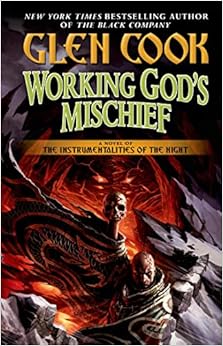
Books of the South: Tales of the Black Company (Shadow Games / Dreams of Steel / The Silver Spike)
Description
“With the Black Company series Glen Cook singlehandedly changed the face of fantasy―something a lot of people didn’t notice and maybe still don’t. He brought the story down to a human level, dispensing with the cliché archetypes of princes, kings, and evil sorcerers. Reading his stuff was like reading Vietnam War fiction on peyote.” ― Steven Erikson, author of Gardens of the Moon Born in 1944, Glen Cook grew up in northern California, served in the U.S. Navy, attended the University of Missouri, and was one of the earliest graduates of the well-known "Clarion" workshop SF writers. Since 1971 he has published a large number of Science Fictionxa0and fantasy novels, including the "Dread Empire" series, the occult-detective "Garrett" novels, and the very popular "Black Company" sequence that began with the publication of The Black Company in 1984. Among hisxa0science fictionxa0novels is A Passage at Arms. After working many years for General Motors, Cook now writes full-time. He lives near St. Louis, Missouri, with his wife Carol. Excerpt. © Reprinted by permission. All rights reserved. The Books of the South Tales of the Black Company By Glen Cook Tom Doherty Associates Copyright © 2008 Glen CookAll rights reserved.ISBN: 978-0-7653-2066-7 Contents Title Page, Copyright Notice, Shadow Games, Acknowledgments, 1. The Crossroads, 2. The Road South, 3. A Tavern in Taglios, 4. The Dark Tower, 5. Chains of Empire, 6. Opal, 7. Smoke and the Woman, 8. Opal: Crows, 9. Across the Screaming Sea, 10. Shadowmasters, 11. A March into Yesteryear, 12. The Shaggy Hills, 13. Willow's Last Night Little, 14. Through D'loc Aloc, 15. The Savannah, 16. Willow's War, 17. Gea-Xle, 18. The Barge, 19. The River, 20. Willow up the Creek, 21. Thresh, 22. Taglios, 23. Willow, Bats, and Things, 24. Taglios: A Princely Pressure, 25. Taglios: Scouting Southward, 26. Overlook, 27. Night Strife, 28. Back to Scouting, 29. Smoke's Hideout, 30. Taglios Aroused, 31. Taglios: a Boot-Camp City, 32. Shadowlight, 33. Taglios: Drunken Wizards, 34. To Ghoja, 35. Before Ghoja, 36. Ghoja, 37. Shadowlight: Coal-Dark Tears, 38. Invaders of the Shadowlands, 39. Stormgard (formerly Dejagore), 40. Dejagore (formerly Stormgard), 41. Lady, 42. That Stump, 43. Overlook, 44. Glittering Stone, Dreams of Steel, Dedication, Envoi: Down There, The Silver Spike, Epilogue, Tor Books by Glen Cook, Copyright, CHAPTER 1 The Crossroads We seven remained at the crossroads, watching the dust from the eastern way. Even irrepressible One-Eye and Goblin were stricken by the finality of the hour. Otto's horse whickered. He closed her nostrils with one hand, patted her neck with the other, quieting her. It was a time for contemplation, the final emotional milemark of an era. Then there was no more dust. They were gone. Birds began to sing, so still did we remain. I took an old notebook from my saddlebag, settled in the road. In a shaky hand I wrote: The end has come. The parting is done. Silent, Darling, and the Torque brothers have taken the road to Lords. The Black Company is no more. Yet I will continue to keep the Annals, if only because a habit of twenty-five years is so hard to break. And, who knows? Those to whom I am obliged to carry them may find the account interesting. The heart is stilled but the corpse stumbles on. The Company is dead in fact but not in name. And we, O merciless gods, stand witness to the power of names. I replaced the book in my saddlebag. "Well, that's that." I swatted the dust off the back of my lap, peered down our own road into tomorrow. A low line of greening hills formed a fencerow over which sheeplike tufts began to bound. "The quest begins. We have time to cover the first dozen miles." That would leave only seven or eight thousand more. I surveyed my companions. One-Eye was the oldest by a century, a wizard, wrinkled and black as a dusty prune. He wore an eyepatch and a floppy, battered black felt hat. That hat seemed to suffer every conceivable misfortune, yet survived every indignity. Likewise Otto, a very ordinary man. He had been wounded a hundred times and had survived. He almost believed himself favored of the gods. Otto's sidekick was Hagop, another man with no special color. But another survivor. My glance surprised a tear. Then there was Goblin. What is there to say of Goblin? The name says it all, an Read more
Features & Highlights
- Marching south after the ghastly battle at the Tower of Charm, the Black Company is hounded by shadowy figures every inch of the way.The game is on: the Company versus the Shadowmasters, deadly creatures that deal in darkness and sorrow.When hope dies, there's still survival. And there's still the Black Company.
- The Book of the South
- is the second omnibus of novels from one of the greatest fantasy epics of our age, Glen Cook's Black Company series―collecting
- Shadow Games
- ,
- Dreams of Steel
- , and
- The Silver Spike
- .





